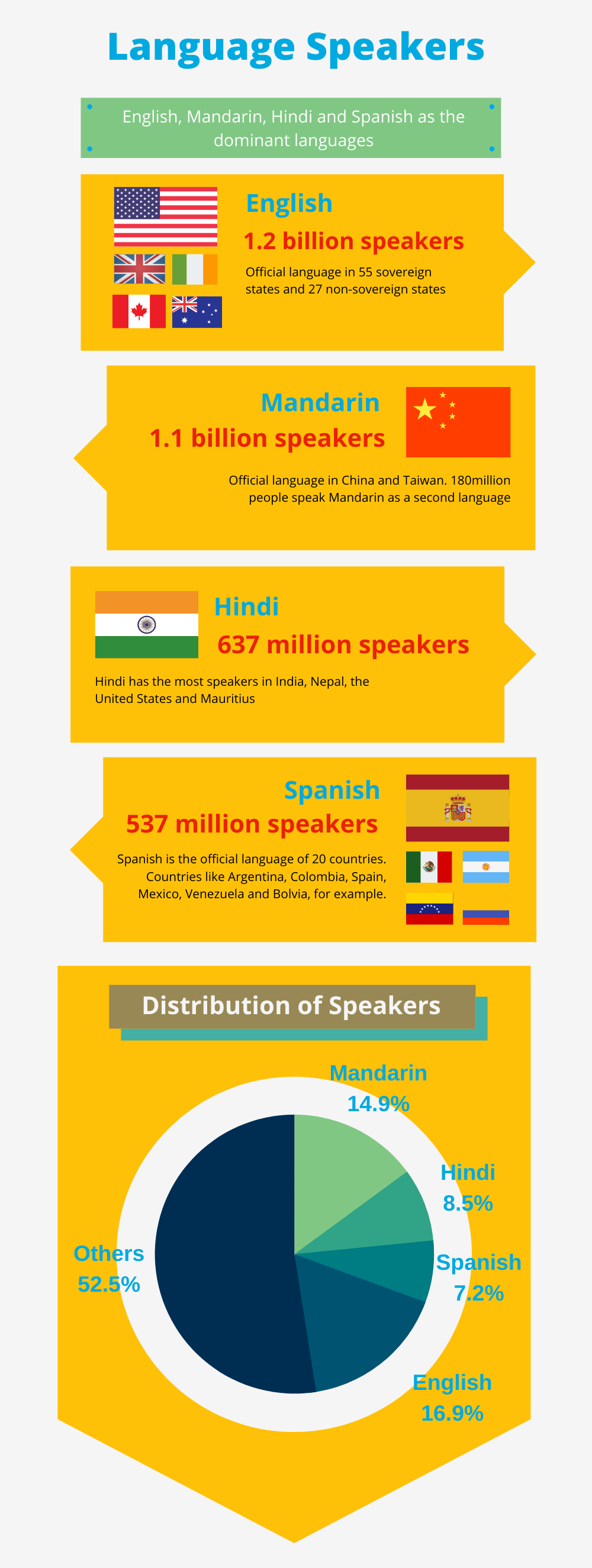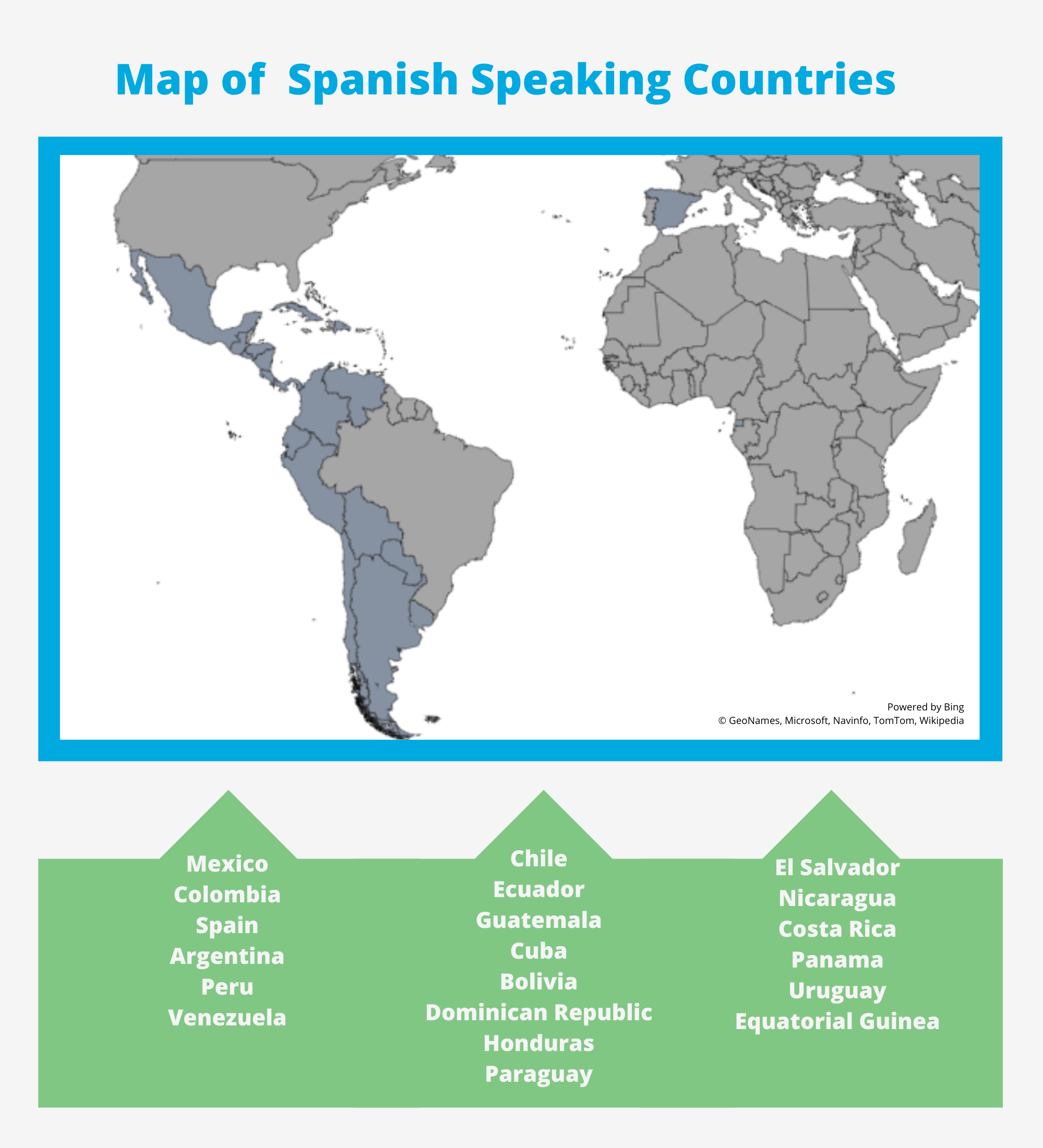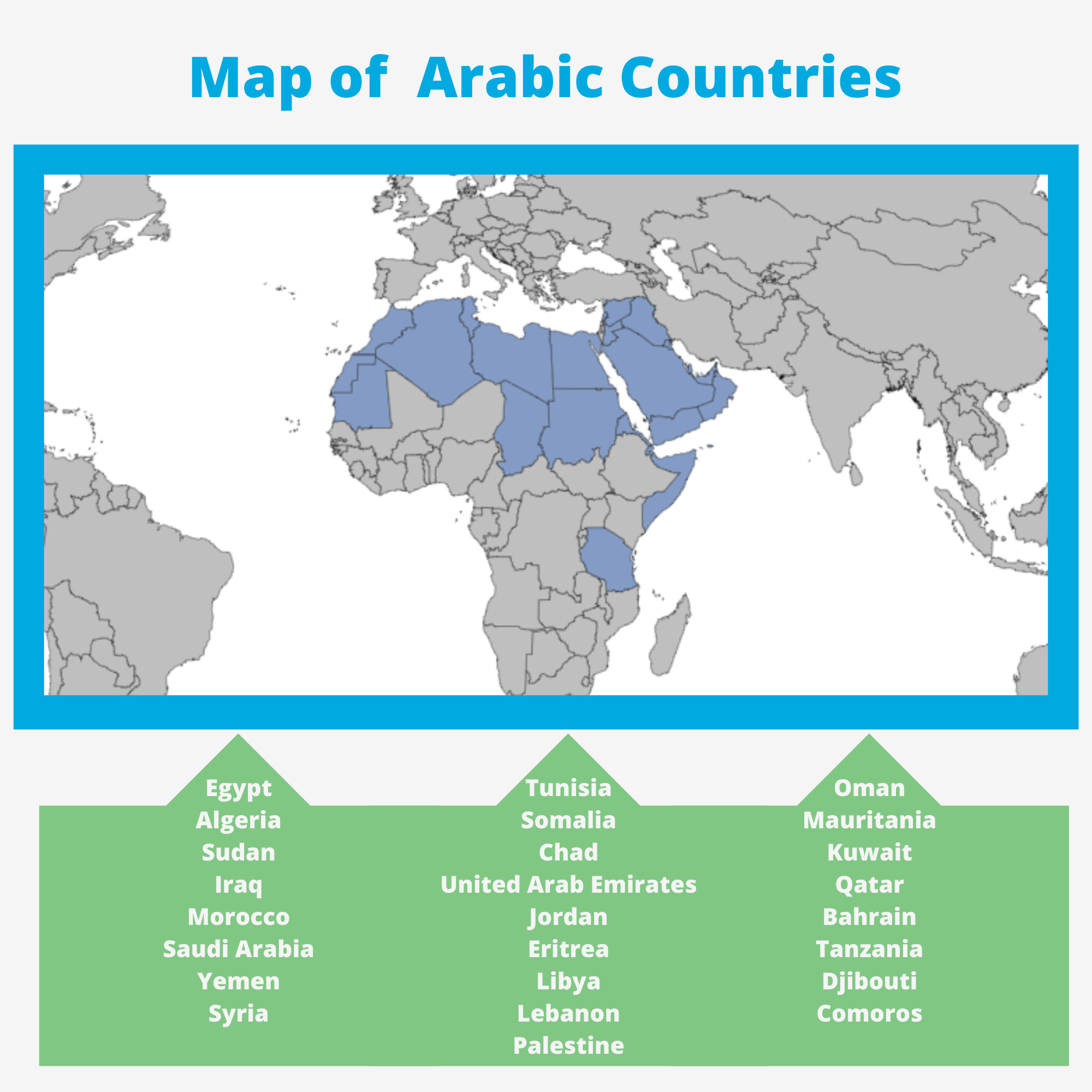Which Foreign Language Should You Study?
Language Decisions
For some people, learning a language is a consequence of life events – things like falling in love with someone from another country or being sent abroad for work. However, for others, taking up a language is a conscious decision to spend many long hours studying and practicing the speech of another country.
There is a wide range of reasons why people decide to learn a new language, including
- career development
- travel
- mental challenge
- or simply intellectual curiosity
...and each reason is as valid as the next.
Often, the choice of which language to learn will be obvious, but for those who are unsure about which one to go for, in this post, I’ll take you through the options and help you make up your mind.
Choosing your first foreign language
You’re a confirmed monolinguist, but you have always felt a pang of envy when you hear people with the gift of tongues, switching effortlessly between languages. It’s a long-held ambition of yours to master a second language, and you’re now ready to try, but which one do you choose?
Most people agree that your first foreign language is always the most difficult, after which, each one becomes progressively easier. This means for your first one, you’ll want something relatively simple to give yourself the best chance of success.
You’ll want to choose a language you’ll be able to manage because if you don’t make progress, you’ll start feeling frustrated and are likely to give up.
Keeping motivated is an important factor, so you should choose a language that interests you as well as one you will have the chance to use.
There’s no bigger boost to your motivation and confidence than when you suddenly realize you can have a real conversation in the language you are learning, but this won’t happen if you study a language you’ll never have the opportunity to speak.
The usual suspects
Taking all these factors into account, for native English speakers, two languages fit the bill perfectly – French and Spanish.
It is for good reason that these are the languages most English speakers are likely to study at school.
Both languages, especially French, share many cognates with English (that’s a fancy way of saying they have lots of words that are the same), which makes learning vocabulary very easy, and neither language has too many sounds that are difficult to pronounce.
Then there’s the grammar.
If you studied one of these languages at school, you might still be haunted by memories of trying to remember the gender of nouns or reciting irregular verb tables, but in the grand scheme of things, the grammar of both languages is relatively easy to get to grips with.
If you live in the US, you have the world’s largest Spanish-speaking country, Mexico, right on your doorstep, while if you are from Britain, France is just a short hop across the channel – so in either case, learning one of these will prove useful.
Furthermore, both are important international languages, and wherever you live, it should be easy to find native speakers to practice with.
In sum, for all these reasons, either would be a solid pick for anyone hoping to get that first foreign language under their belt.
The other contenders
If you don’t want to learn either of these, there are some other options to consider. Italian and Portuguese are closely related to French and Spanish, and the difficulty level is about the same. They, too, are languages with large numbers of speakers, so you should have no trouble finding opportunities to practice them – and if you plan to travel to Italy, Portugal or Brazil, these could be obvious choices.
Another possibility is German. In terms of grammar, this language is more of a challenge – German has four cases to master, and the word order can be disconcerting for speakers of English. However, for the most part, the pronunciation is not hard, and German also shares many cognates with English, greatly facilitating the acquisition of vocabulary.
Learning for business and your career
While some people learn languages simply for the experience, the intellectual challenge or the kudos that comes with being bilingual, others have more practical reasons for wanting to study.
A common motivation is career advancement. Being able to speak foreign languages can open doors in the world of business, and having a language or two on your resumé can make you more attractive to a potential employer.
The five I’ve already mentioned are all highly sought-after languages in the job market. Spanish is the key to doing business throughout most of Latin America while Portuguese gives you access to Brazil. France and Germany have two of the world’s largest economies, making these valuable languages to know, and French is also spoken in large parts of Africa, potentially unlocking business opportunities throughout the continent.
However, these are not the only languages that are highly prized by international companies.
Japan is an industrial powerhouse, and being able to speak Japanese has long been considered a valuable asset. More recently, with China’s rapid rise to prominence, Chinese has also become one of the most popular languages to study.
Knowing either of these is arguably more valuable than knowing something like French or Spanish since they are considered much harder to learn so fewer people are able to gain proficiency in them.
In the same category are languages like Russian and Arabic, two more tongues that are tough to master but that are very much in demand in the world of business.
Learning for travel – a surprising statistic
Other than career development, an obvious reason to learn a language is for travel, but in this case, which is the best choice?
If you just take the raw numbers, after English, the languages with the largest numbers of speakers are Chinese, Spanish and Hindi, so if you simply want to be able to communicate with the most people around the world, those are the ones to go for.

It is estimated that globally, 1.2 billion people speak English as either a first or second language. Mandarin Chinese has a further 1.1 billion speakers while Spanish and Hindi have 537 million and 637 million respectively. Source
This means that if you know just these four languages, by a rough calculation, you will be able to communicate with about 49% of the planet’s 7.5 billion inhabitants!
However, it isn’t quite as simple as that.
Where can you use it?
If you are interested in learning a language for travel, the single most obvious and important consideration is where you plan to visit since this will dictate which language is most useful for you.
If you don’t have a particular region in mind, though, and just want to learn a language that might come in handy when you’re on the road, there’s something else you should take into account.
Rather than thinking about the total number of speakers a language has, another way to look at it is the number of countries where a language is spoken.
For example, while Chinese has far more speakers than Spanish, the majority of them are found in just one country, China.
Spanish, on the other hand, is spoken throughout many countries in Latin America – as well as in Spain itself – which means Spanish will be useful in more countries, making this a smarter choice.

It’s possible to argue that, although China is only one country, it is larger than all the Spanish-speaking countries combined. Additionally, there are also many Chinese speakers throughout Southeast Asia, so if you are likely to be spending much time in the Far East, Chinese would be a good one to know.
Ultimately, it comes down to where you are likely to travel.
For example, learning Arabic would be useful for travel throughout the Arab world, stretching from Morocco to the Middle East.

Although there are many dialects of Arabic, and knowing one won’t automatically allow you to speak or understand another, learning a version of Arabic will equip you with linguistic and cultural tools that will facilitate your travel and greatly enrich your experience in this vast region.
For travel in Africa, French and English are useful, but in terms of African languages, Hausa, spoken in West Africa, and Swahili, the lingua franca of the Great Lakes region, are among the most worthwhile to work on. FSI courses are available for both.
Learning for culture
If your interests are more high brow in nature, you might want to learn a language that will allow you to gain a deeper insight into one of the world’s great cultures, and for those with a passion for art, literature or philosophy, French presents itself as an obvious choice.
Italy, too, is a country with a rich tradition of art and literature, and Italian is also the language of music. Learning Italian will allow you to understand the great Italian operas, and you will be able to throw yourself into the world of the Italian Renaissance – Rinascimento in Italian – which began in the city of Florence.
On a more popular level, Korean has become one of the most widely studied Asian languages thanks to the success of K-Pop and Korean soap opera, and this could be your motivation for taking it up. But even if you only start learning Korean because you want to understand what Psy was singing about in Gangnam Style, you will quickly find yourself immersed in the rich culture of a country with traditions and customs that stretch back hundreds of years.
It is impossible to separate a language from the culture of the people who speak it, and you can’t learn the former without gaining a deeper understanding and appreciation of the latter. For this reason, taking up any language will be a journey of cultural discovery and enlightenment.
In many ways, it doesn’t matter which one you choose because every language will surprise you in ways you couldn’t imagine before you began.
Taking on a challenge – how much torture can you bear?
When choosing your first foreign language, it’s natural to opt for something easy, but after your first couple, you might be itching for a challenge. In that case, several strong candidates present themselves.
Very often, Standard Chinese (Mandarin) is cited as one of the most difficult languages for speakers of English to learn. However, it isn’t even the most difficult language in China, and if you want something to test yourself against, try Cantonese instead.
Spoken in China’s southern Guangdong and Guangxi provinces as well as in Hong Kong and Macau, this is a language that makes Standard Chinese seem simple by comparison.
One of the most difficult aspects is the tone system. While Mandarin has four clearly defined tones, astonishingly, scholars disagree on the precise number of tones in Cantonese. However, most would put it at around eight – so if you think the tones of Mandarin sound tough, good luck with this one!
Another Asian alternative that is sure to get your tongue in a twist is Vietnamese. This time, you have six tones to contend with, a couple of which are particularly tricky, and there are a large number of vowel sounds that English speakers often have difficulty distinguishing or reproducing.
A grammatical challenge
If you prefer to be challenged grammatically rather than phonologically, Czech could be an option. It has a complicated case system and no fewer than four genders, so this is a language that will tie your brain in knots.
As a bonus, it also has arguably the most difficult consonant to pronounce in the whole of Europe, a sound so notoriously hard to produce that even Czech children have to be taught to say it properly in school.
However, for truly sadistic linguists who thrive on torture and suffering, surely the most impenetrable of Europe’s tongues has to be Hungarian.
With at least 18 cases but arguably more, it has a grammar that makes Czech look positively simple.
Then there’s the fact that it’s so idiomatic that even if you understand every word in a sentence you may still have no idea what a person is speaking about.
In short, if you want to pit your wits against a language that will push you to the edge of insanity, this one is calling your name.
Learning out of curiosity – are you tempted by tones?
Even those of us who love learning languages might balk at the thought of attempting something like Cantonese or Hungarian, but if you already have one or two in the bag, it can be fascinating to learn a language that works differently from anything you have seen before.
If you only speak European languages, tonal languages might pique your curiosity since the concept of a word having more than one meaning depending solely on its intonation may seem entirely alien.
In Europe, Swedish and Norwegian are the closest you will find, but many Asian and African languages rely more heavily on tones.
Along with those mentioned above, Thai is another tonal language, this time with five distinct tones. Many of the languages of sub-Saharan Africa also make use of at least two or three tones, and Bantu languages like Chewa (Chinyanja) or Kirundi could be worth a look.
Learning a new script
In Europe, most languages use the Latin alphabet, and we tend to think of it as normal for different languages to share a script. However, in other parts of the world, this is not the case, and many languages have their own unique writing system. This means, for some, the challenge of learning a new alphabet could be appealing.
Russian, Bulgarian and others are written in the Cyrillic script while Greek has an alphabet of its own, and both writing systems are easy to master. More exotic, although just as easy, is Korean. The Korean writing system is reputed as one of the quickest and easiest to learn – although don’t expect the rest of the language to be as painless.
Many of the languages of India have their own writing systems, and major languages like Hindi or Tamil could be good choices if you want to learn a new alphabet. This is also true of Asian languages like Thai, Burmese and Khmer (Cambodian), all of which look suitably weird and exotic.
However, arguably the most bizarre and beautiful writing is Sinhala, the language of Sri Lanka, so if you want to choose a language just for the way it is written, this could be the one you are looking for.
Curious grammar and structures
Alternatively, you might be interested in languages that are structurally different from what you know, in which case your best bet is to look outside of the language families with which you are familiar.
English belongs to the Indo-European family, a group that includes the Romance languages, the Germanic languages, the languages of northern India like Hindi and other languages like Persian. You might not realize, but all these languages are distant cousins and function in broadly similar ways.
For something more profoundly different, you might try Turkish, from the Turkic language group. It is of interest to linguists for its surprising regularity, but for English-speaking polyglots, its use of agglutination will also be fun to learn.
This is a system whereby words are modified by affixes that change the meaning of a base word. A famous example is as follows:
Çekoslovakyalılaştıramadıklarımızdanmışsınız
This single word means "you are one of those that we were not able to convert into Czechoslovakians".
As you can see, if you want to have a go at a language that works quite differently from English, Turkish will provide some amusement.
Many of the languages from the south of India, including Tamil and Malayalam, belong to the Dravidian language family and are unrelated to Indo-European languages. They are all also agglutinative and could be of interest if you want to try something unfamiliar.
Malay-Indonesian is another language that uses a similar system of affixes – and it’s also a distant relative of Hawaiian!
Language isolates
Finally, you could decide to learn a language isolate, a language that has no other linguistic relations. In Asia, Korean is a good example, while in Europe, Basque is another option.
The Basque language is particularly fascinating for a number of reasons, one of which is that it is thought to be an example of a surviving prehistoric language that existed in Europe before the arrival of the Indo-European languages. For many people, this alone could be reason enough to study it.
An undertaking that will change your life
Learning a language is a long-term commitment, and choosing which one to study can be a big decision. Your choice will probably depend on a combination of the factors I’ve mentioned in this post, but it is no exaggeration to say that the language you choose to learn can alter the course of your life.
Through learning a language, you will make friends with its native speakers and you will probably visit the country or countries where it is spoken. You may even end up marrying a person from that country and moving there to settle down.
If you can speak the local language, the people there will adopt you as one of their own, and the country of a language you have learned is likely to occupy a special place in your heart.
When you start a new language, you don’t know where the path will lead, but many years later, you may find yourself looking back and realizing that the day you began learning that language was a pivotal moment in your life.
In the end, perhaps it doesn’t matter which one you choose because you can never know where the journey will take you.